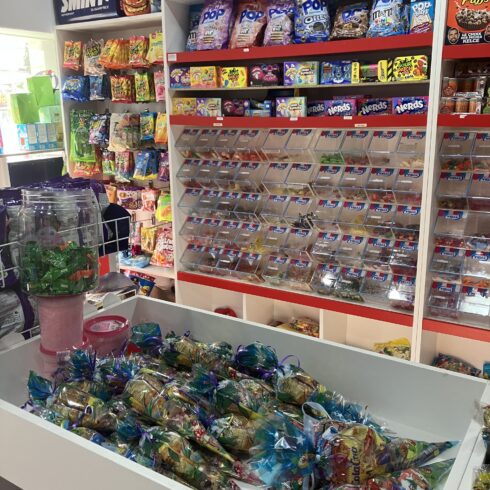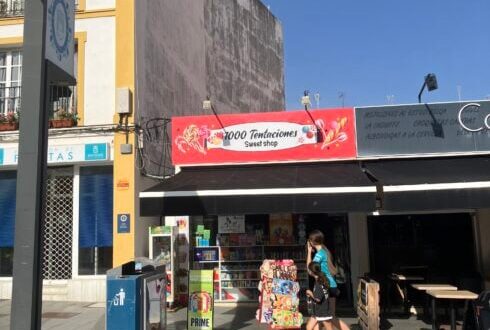ONE of my earliest memories of Spain isn’t of a landmark or a family meal – it’s of a sweet shop.
My dad and I were visiting Bilbao when I was only three years old. I was astonished to see the store stacked from wall-to -wall with colorful treats.
The shopkeeper gave me a bag of plastic and I walked down the aisles with my eyes wide open, examining all the tempting sweets and chocolats available.
It was pure, magical joy for little me – a memory that has stuck with me long after the sugar rush faded.
Years later, I was curious to see if that same culture still existed in Spain and if it had changed at all in the past 18 years.
Sweets are still a major part of Spanish grocery shops. You will find sweets in every Dia, Carrefour and Mercadona. Sweet shops are still available in more traditional forms.
To find out, I visited San Pedro Alcantara, where I met a man defying the odds – and proving that for now, at least, the sweet shop still has a place in Spain’s retail heart.

Jose Manuel Nuno Garcia is the owner and operator of 1000 Tentaciones in San Pedro Alcantara. The name 1000 Temptations is a fitting one. It is a family-run business that he and his wife Yana have been running for two years. His Asturian friends warned him that the business would not last more than a few months. Now that the shop has been open for over two years, business is booming.
More than 70 sweets are available in his shop. He told me that it is still very common to use a bag and gloves, and then browse through the sweets. Social media has changed the sweets business in today’s society.
You can request whatever is in vogue at the time. There’s currently a high demand for Swedish sweets and acid sweets. Nuno explains that Scandi Candi is a sweet store a couple minutes from his shop, which offers sweets mostly from Scandinavian nations.
This demand for imported sweets is not without its downsides. Due to expiry dates or distance, things can’t be returned. He also needs to be able to afford the air conditioning so that chocolates like Snickers don’t melt. He laughs, “During the blackout, I prayed all day long that the chocolate would not melt.” He has eight refrigerators that need to be kept running. “People buy drinks as well, not only sweets.”

When compared to public ‘kioskos’, sweet shops are a little bit riskier. Kioskos, which are owned by ayuntamientos and pay lower rent fees, can be found in strategic places such as the street or outside of a school. Kioskos are usually located in strategic areas, like on the street outside a school or next to a public building. He points out that in kiosks you can’t pick and choose your sweets. You have to ask for it.
Nuno explains that in the north of Spain, where he comes from, sweet shops like his are more common, but there is less demand for imported goods, as there are no expats. Americans, Norwegians, Saudis and others are regulars in his shop. “People are richer here and you can tell the difference.”
However, it is a very risky venture. Money is lost when something doesn’t work. Squid Game candy, based off the Netflix TV series, is selling well, but chewing-gum from America, not so much.


Imports are expensive too: a box of 24 Snickers for example can cost €36 and if they are not all sold they can become money down the drain.
“Sweets don’t have to be bought on a regular basis like bread and milk. They are impulse purchases.” This makes the business more risky. He says that most of his clients are young girls and boys, but there are more girls.
Has he noticed a difference in the sweet shop culture since he grew up?
“When I was younger, I did not buy anything every day. Now, things are different. Times have changed and people come to Marbella more often.” Marbella is a completely different place, with a level financial capability that’s scandalous. Las Vegas.
“I can’t tell people back home, in Asturias, that people come here to spend €80 or €100 a week on sweets, people who have cars and a lot of money.”
What is the truth about sweets contributing to obesity?
“I see people in northern countries taking better care of themselves. They do more exercise or refuse sugar. South Americans may be genetically heavier, but they also party, eat and drink a lot. “Young people are also taking better care of themselves.”
He also adds that climate has a great deal to do with health. Asthma, obesity and other health problems led him to leave Asturias. Marbella is a great place for his health.


Today, if possible, visit your local sweet shop. You’ll find a wide variety of treats and are sure to find one that suits your palate.
Click here to read more Business & Finance News from The Olive Press.
 Costa News Spain Breaking News | English News in Spain.
Costa News Spain Breaking News | English News in Spain.







